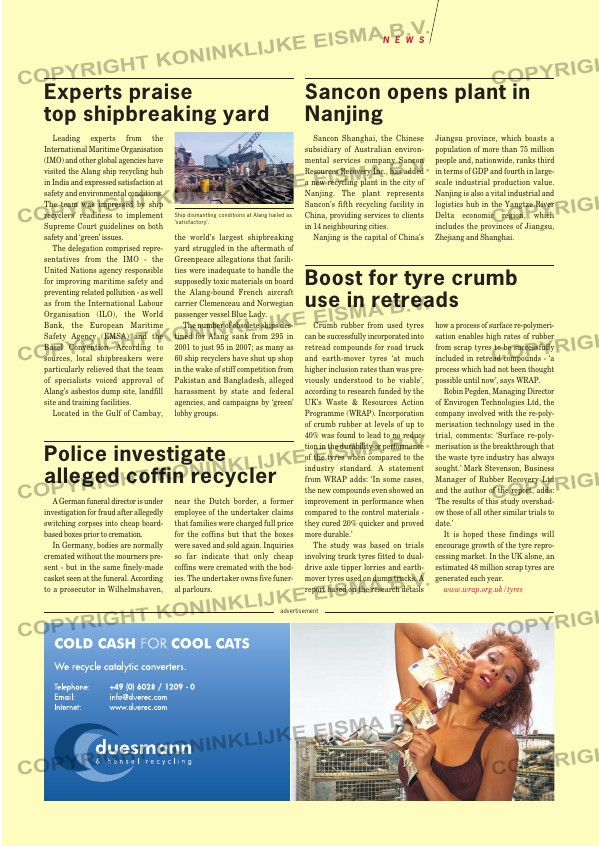Page 19 from: January / February 2008

N E W S
Sancon opens plant in
Nanjing
Sancon Shanghai, the Chinese
subsidiary of Australian environ-
mental services company Sancon
Resources Recovery Inc., has added
a new recycling plant in the city of
Nanjing. The plant represents
Sancon’s fifth recycling facility in
China, providing services to clients
in 14 neighbouring cities.
Nanjing is the capital of China’s
Jiangsu province, which boasts a
population of more than 75 million
people and, nationwide, ranks third
in terms of GDP and fourth in large-
scale industrial production value.
Nanjing is also a vital industrial and
logistics hub in the Yangtze River
Delta economic region, which
includes the provinces of Jiangsu,
Zhejiang and Shanghai.
advertisement
Experts praise
top shipbreaking yard
Leading experts from the
International Maritime Organisation
(IMO) and other global agencies have
visited the Alang ship recycling hub
in India and expressed satisfaction at
safety and environmental conditions.
The team was impressed by ship
recyclers’ readiness to implement
Supreme Court guidelines on both
safety and ‘green’ issues.
The delegation comprised repre-
sentatives from the IMO – the
United Nations agency responsible
for improving maritime safety and
preventing related pollution – as well
as from the International Labour
Organisation (ILO), the World
Bank, the European Maritime
Safety Agency (EMSA) and the
Basel Convention. According to
sources, local shipbreakers were
particularly relieved that the team
of specialists voiced approval of
Alang’s asbestos dump site, landfill
site and training facilities.
Located in the Gulf of Cambay,
the world’s largest shipbreaking
yard struggled in the aftermath of
Greenpeace allegations that facili-
ties were inadequate to handle the
supposedly toxic materials on board
the Alang-bound French aircraft
carrier Clemenceau and Norwegian
passenger vessel Blue Lady.
The number of obsolete ships des-
tined for Alang sank from 295 in
2001 to just 95 in 2007; as many as
60 ship recyclers have shut up shop
in the wake of stiff competition from
Pakistan and Bangladesh, alleged
harassment by state and federal
agencies, and campaigns by ‘green’
lobby groups.
Ship dismantling conditions at Alang hailed as
‘satisfactory’.
Boost for tyre crumb
use in retreads
Crumb rubber from used tyres
can be successfully incorporated into
retread compounds for road truck
and earth-mover tyres ‘at much
higher inclusion rates than was pre-
viously understood to be viable’,
according to research funded by the
UK’s Waste & Resources Action
Programme (WRAP). Incorporation
of crumb rubber at levels of up to
40% was found to lead to no reduc-
tion in the durability or performance
of the tyres when compared to the
industry standard. A statement
from WRAP adds: ‘In some cases,
the new compounds even showed an
improvement in performance when
compared to the control materials –
they cured 20% quicker and proved
more durable.’
The study was based on trials
involving truck tyres fitted to dual-
drive axle tipper lorries and earth-
mover tyres used on dump trucks. A
report based on the research details
how a process of surface re-polymeri-
sation enables high rates of rubber
from scrap tyres to be successfully
included in retread compounds – ‘a
process which had not been thought
possible until now’, says WRAP.
Robin Pegden, Managing Director
of Envirogen Technologies Ltd, the
company involved with the re-poly-
merisation technology used in the
trial, comments: ‘Surface re-poly-
merisation is the breakthrough that
the waste tyre industry has always
sought.’ Mark Stevenson, Business
Manager of Rubber Recovery Ltd
and the author of the report, adds:
‘The results of this study overshad-
ow those of all other similar trials to
date.’
It is hoped these findings will
encourage growth of the tyre repro-
cessing market. In the UK alone, an
estimated 48 million scrap tyres are
generated each year.
www.wrap.org.uk/tyres
Police investigate
alleged coffin recycler
A German funeral director is under
investigation for fraud after allegedly
switching corpses into cheap board-
based boxes prior to cremation.
In Germany, bodies are normally
cremated without the mourners pre-
sent – but in the same finely-made
casket seen at the funeral. According
to a prosecutor in Wilhelmshaven,
near the Dutch border, a former
employee of the undertaker claims
that families were charged full price
for the coffins but that the boxes
were saved and sold again. Inquiries
so far indicate that only cheap
coffins were cremated with the bod-
ies. The undertaker owns five funer-
al parlours.
RI_012 NEWS:Opmaak 1 24-01-2008 09:26 Pagina 19



